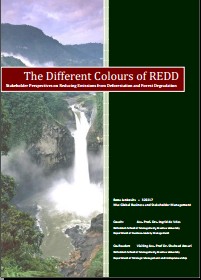Ilona Jankovits - 320217- Msc Global Business and Stakeholder Management - The Different Colours of REDD
Money does not grow on trees. In the literal sense this is true, but that does mean that despite the lack of currency as foliage, trees do not have any value. However, in our current system we seem to have issues with internalizing this value. We create a trade-off between economic profits and maintaining our ecosystems. The costs and benefits of the services our ecosystems provide globally are not internalized in our economic system and therefore the main stakeholder spheres of market, state and civil society are inclined to deforest to make money out of the trees. We are still struggling to find a solution to this issue that results in deforestation and this motivated me to write my master thesis about this topic.
The loss of our forests is an issue of commons management. Common resources are resources in which consumption reduces the amount available for other users and it is difficult to exclude or control access of users. So far the depletion of these common resources has not been halted. The common resource management literature indicates several important trends; more attention to external factors is required, global commons are becoming more important, stakeholder perceptions play a major role and market based incentives as well as co-management are possible solutions. Forest management is also a suitable case for analyzing the trends in this body of literature, as it is a global commons that is currently seeing the introduction of co-management and market based incentive solutions.
A promising solution for forest management is Reducing Emissions from Deforestation and Forest Degradation (REDD), which attempts to create value for standing forests by valuating the carbon trapped within forests. It is likely that REDD will combine market incentives with wider policy changes. Analyzing the literature on REDD shows the involved parties are still debating several aspects, including the source of finance, the scale, the goals, governance and the type of agreement. These debates are riddled with unclarity as well as different viewpoint and definitions. A common understanding between stakeholders is essential for reaching an agreement. Therefore I decided to focus my research on the different perspectives a wide range of stakeholders have regarding major debates within REDD. With the results I hope to offer lessons for the academic field of common resource management and form an objective overview of the perspectives of key stakeholders, which can facilitate their ongoing dialogue.
The Conclusions
From my interviews and other means of data collection it appeared that a vital aspect of successful commons management is collaboration and co-management. Even in commons of a global scale, the importance of community involvement is gaining acceptance. However, community management alone is not sufficient, as governments have to back up the tenure system and prevent illegal encroaching on community territory, as well as tackling larger deforestation drivers. Both the literature and the respondents acknowledge the best chance of success is when the benefits of both national and local management are combined.
Furthermore, the understanding and values of stakeholders are vital to reaching an agreement. The way drivers of deforestation are perceived by actors influences how they view the potential solution. Under closer scrutiny it also appears that many viewpoints that seem to clash at first glance are actually quite similar. Opposition is sometimes based on unjust assumptions of how other stakeholders view the matter.
The literature and respondents both indicate that dialogue results in gradual movement towards a common understanding between parties and the building of trust. However, some conflict will always remain, partly because of diverging values. One of the main reasons for resource depletion is the lack of monetary value attributed to ecosystem services. Whether it is best to adjust nature’s values to our current system or to avoid this as it will keep a broken system intact, is a debate based on principles.
One of the main conclusions of my research is that the best solution for the issue of deforestation is a holistic one. Some argue that separate measures such as improved governance and clear tenure are the solution, instead of creating value for standing forests. However, the literature shows that an overarching framework of financial incentives is likely to be needed to address these separate issues at a larger scale. The majority of stakeholders appears to be in favour of continuing with REDD.
However, the consensus is that financial incentives alone are not enough. The objectives of the REDD programme is an issue of major debate. The literature shows opposing camps of those that see equity and ecological co-benefits as a fundamental requirement, while others feel it is erroneous to prioritize co-benefits at the expense of carbon emission mitigation. Unlike the literature, which focuses on the trade-offs of linking the issues, the collected data indicates stakeholders see a holistic solution as a necessity. Forests are ecosystems with multiple values, not just carbon. The whole ecosystem has to be considered to ensure long-term solutions, not short cuts facilitating only carbon absorption. Attempting to create a holistic solution will by no means be easy.
Valuating the carbon storage of forests alone is already a complicated matter, let alone valuating ‘softer’ effects such as biodiversity benefits or community involvement. Although the combination might make the debates more complex, it will lead to better solutions. Global commons are more complex to manage due to the interlinkages between commons and from my research it becomes apparent that stakeholders are becoming aware of the importance of these interlinkages. The REDD negotiations will have to work towards a holistic solution, to prevent the commoditization of separate aspects, leading to suboptimal solutions and undervaluation of ecosystems as a whole.
To contact Ms. Jankovits, please use our contact form...
|
Further reading:
---------------
The Different Colours of REDD


